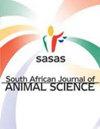Addition of homeopathic products to pig diets in the finishing phase promotes improvement in growth performance
IF 0.6
4区 农林科学
Q3 AGRICULTURE, DAIRY & ANIMAL SCIENCE
引用次数: 0
Abstract
Homeopathic products (HP) are a preventive and therapeutic alternative in pig farming. This study evaluated the effect of the concentration of dietary HP on performance, carcass traits, meat quality, and plasma metabolites of growing-finishing pigs. A total of 60 crossbred male pigs (Agroceres PIC × DanBred), immunocastrated at 90 and 120 days old, with an initial BW of 30.71 ± 2.60 kg were allocated in a completely randomized design to three treatments: i) control diet (CT), without HP), ii) CT + HP1 (Figotonus® and Sanoplus®) (1 g/kg of diet), and iii) CT + HP2 (Figotonus and Sanoplus) (2 g/kg of diet). The results indicate that pigs fed diets containing HP2 had a greater average daily gain compared with those fed the control diet, although a higher feed efficiency was observed when pigs were fed the HP1 diet. Animals fed the HP2 diet showed a slight increase in initial postmortem pH in the Longissimus dorsi muscle compared to the control group. Pigs fed HP2 showed a higher initial temperature in the L. dorsi than those fed the control diet. However, there was no effect on plasma metabolite concentration. Based on the results of the present study, the HP1 diet enhanced the performance of finishing pigs without negative effects on meat traits and plasma metabolites.在肥育期在猪饲粮中添加顺势疗法产品有助于提高猪的生长性能
顺势疗法产品(HP)是一种预防和治疗猪养殖替代。本研究评估了饲粮HP浓度对生长育肥猪生产性能、胴体性状、肉品质和血浆代谢物的影响。试验选用90日龄和120日龄免疫去势、初始体重为30.71±2.60 kg的杂交公猪(Agroceres PIC × DanBred) 60头,采用完全随机设计分为3个处理:1)对照饲粮(CT),不添加HP; 2) CT + HP1 (Figotonus®和Sanoplus®)(饲粮1 g/kg); 3) CT + HP2 (Figotonus®和Sanoplus)(饲粮2 g/kg)。结果表明,饲粮中添加HP2的猪平均日增重高于对照组,但饲粮中添加HP1的猪饲料效率更高。与对照组相比,饲喂HP2饲料的动物死后背最长肌的初始pH值略有增加。饲喂HP2的猪的背乳杆菌初始温度高于饲喂对照饲料的猪。但对血浆代谢物浓度无影响。本研究结果表明,HP1饲粮提高了育肥猪的生产性能,但对肉质性状和血浆代谢产物没有负面影响。
本文章由计算机程序翻译,如有差异,请以英文原文为准。
求助全文
约1分钟内获得全文
求助全文
来源期刊

South African Journal of Animal Science
农林科学-奶制品与动物科学
CiteScore
1.50
自引率
0.00%
发文量
39
审稿时长
>36 weeks
期刊介绍:
The South African Journal of Animal Science is an open access, peer-reviewed journal for
publication of original scientific articles and reviews in the field of animal science. The journal
publishes reports of research dealing with production of farmed animal species (cattle, sheep,
goats, pigs, horses, poultry and ostriches), as well as pertinent aspects of research on aquatic
and wildlife species. Disciplines covered nutrition, genetics, physiology, and production
systems. Systematic research on animal products, behaviour, and welfare are also invited.
Rigorous testing of well-specified hypotheses is expected.
 求助内容:
求助内容: 应助结果提醒方式:
应助结果提醒方式:


